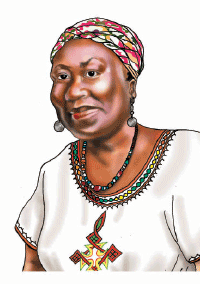For residents of Ile-Ife in Osun State of Nigeria, the demise of the Ooni, Oba Okunade Sijuwade, has, expectedly, been accompanied by some interesting developments within the ancient town and its environs. Once the news broke of his passing away in a hospital in the United Kingdom, palpable fear stoked by rumours of impending human sacrifices gripped the town: the king cannot depart alone into the great beyond; he has to be accompanied on his final journey by only God knows how many others. Friends and families from all over the country called, offering strong advice against night outings. This was particularly important for the large student population in the town, given the existence of several tertiary institutions in and around Ile-Ife. On Monday, August 10, 2015, the Awara of Ifewara announced on behalf of the chiefs of Ile-Ife that the official announcement of Oba Sijuwade’s death would be made the following Wednesday, and was to be preceded by a ceremony during which Oro worshippers would go around the town to perform the final rituals for the late king. Residents were thus ordered to stay indoors between the hours of 9.00 a.m. and 4.00 p.m., given that the Oro cult performance cannot be observed by the common people. The entire town was to shut down!
Now, these same chiefs who announced that final rites would be performed had gone to Governor Rauf Aregbesola the day after news of the Ooni’s demise broke to “debunk the media report” and assure the governor that their king was alive and well. Of course, everybody knew that this was a case of acting out the script dictated by tradition regarding the announcement of the passing away of a traditional ruler. To begin with, Yoruba traditional belief holds that obas do not die; instead, they “ascend into the ceiling” . Furthermore, the announcement of a king’s demise, presumably, can only be made by the right group of people, namely the chiefs, not just anybody. You cannot break the news of the death of the oba via Twitter or Instagram.
It is time to begin a process of serious interrogation of some of our cultural practices, especially given their apparent incongruity with the realities of our present lifestyle. If a traditional ruler is able to be flown abroad and admitted into a hospital, how can we insist that whatever happens to him there would remain a secret? In these days of instant information! More importantly still, why does our culture love secrecy so much? What is wrong with people being informed that a king has died immediately the event occurs? Of what continuing benefit to us as a society are these beliefs that make far too much of ordinary human beings like obas, pretending that they are deities, even though while they are alive and bear rule we are able to attest to their humanness, warts and all? Did not many of our traditional rulers show themselves to be just like the rest of us during the last elections, for example? Did they not collect bribes from politicians like the other citizens did? Are we not aware that they sell chieftaincy titles and exploit their positions for undue advantage in a variety of ways, including in obtaining government contracts for their companies and being a financial burden on the local governments in their areas?
Nigeria is currently seeking to transform its society, through a renewed political process, into one where democratic principles will become better entrenched and inform the practice of governance. Now, among the democratic principles which we are seeking to entrench are those of equality (for all citizens) and transparency in governance. These issues must begin to be taken seriously if we wish to make significant progress along the path of development. How far will we go if we continue to promote practices which are not undergirded by the very values through which we seek to transform our society? Age-old practices not undergirded by truth, transparency and equality continue to keep us bound – and probably succeed in keeping true development a mirage. Which developed society, for example, continues to maintain practices which require the shutting down of an entire town when its traditional ruler dies? Indeed, how many traditional rulers can a nation afford, and what specific roles would they be required to perform?
Arguably, our experiences of slavery and colonisation have led us into adopting an overly sentimental and uncritical attitude towards our culture, being suspicious of any attempt at questioning, and labeling such as evidence of “Westernised” thinking. We keep enforcing practices determined by circumstances which prevailed centuries ago, thus making ourselves slaves of our own culture. We forget that cultural practices are actually determined by the people, based on their realities at specific periods of their existence. And yet, there are several of our cultural practices which we have been able to jettison, or which at least are gradually being transformed. For example, the practice of facial and body marks has considerably abated, presumably because the conditions which encouraged their use no longer prevail. Culture is never static.
No, this is not about promoting an irreverent attitude which seeks to denigrate our culture in totality. Indeed, there are aspects of our culture, for example in the area of clothing and hairstyles, which are currently undergoing a renaissance – a positive development. All that is being advocated is a continuous engagement with culture such that it rids us of conflicting value orientations.











